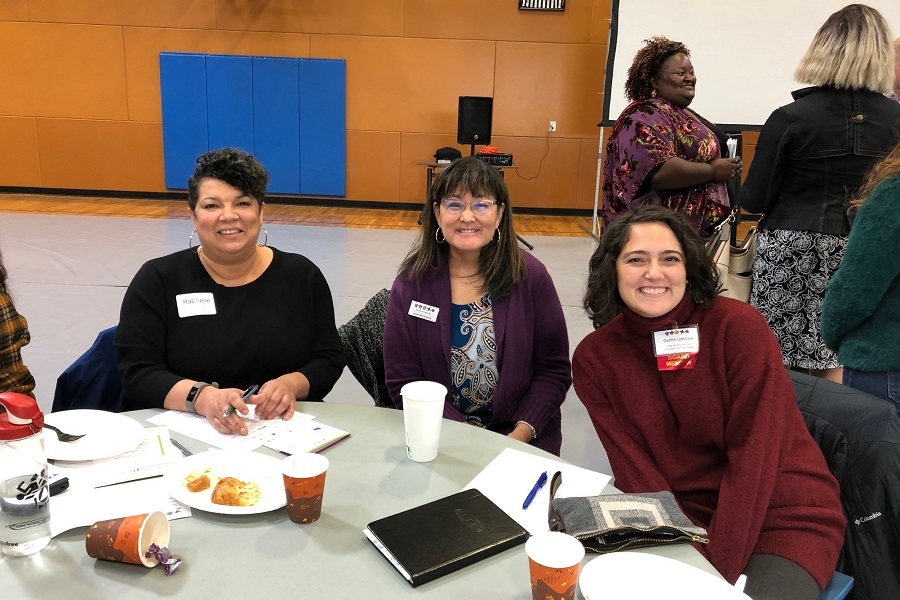A report finds widespread racial prejudice at Oregon companies.
Last year Partners in Diversity, an organization dedicated to attracting and retaining diverse talent, commissioned the Workforce Diversity Retention Project, a scientific study on the experiences and outcomes of people of color at Oregon companies.
The study, conducted by Martinez Organizational Consulting, surveyed nearly 300 professionals of color from across the state, 45% of whom held management positions. It also conducted 30 in-depth qualitative interviews.
While the study was conducted before the national protests over the death of George Floyd on May 25, the report found widespread racial prejudice in the workplace, a lack of broad diversity and a culture of isolation that punishes employees of color who spoke up to management.
RELATED STORY: Black Lives Matter: Improving Racial Justice In the Workplace
Below are five takeaways from the study:
1. Most employees of color face discrimination at work
Nearly three in four respondents (74%) reported facing discrimination at their place of work, and only 27% of employees said they felt satisfied with their job.
“Coming from the South, my friends and family thought I was escaping much of the racism we experienced,” said one respondent. “We now know that racism, xenophobia, and prejudice all live here too, but in less overt forms. White liberals often are at this intersection in my experience.”
These experiences ranged from social exclusion and unintentionally hurtful comments to overt racist remarks from co-workers.
One respondent reported how they were accosted by a fellow employee who was an outspoken member of the Proud Boys, a far-right, neofacist organization. After the incident, managers did not respond with disciplinary action.
Only 17% of respondents said they felt supported by their organization’s upper level of management. Partners in Diversity says that having management and human resource divisions well-versed in diversity, equity and inclusion practices can help to mitigate these situations.
2. Companies employ few people of color
Only 12% of respondents reported their workplace was diverse. Most employees of color (70%) said they experience “tokenism,” in which they are the sole spokesperson for their ethnic group at their organization.
Curtis Robinhold, executive director of the Port of Portland, recommended in an online panel about the findings of the study that managers organize affinity groups for employees of color to help them find community within the organization.
Building community for employees of color is crucial to solving issues of tokenism. Mari Watanabe, executive director of Partners in Diversity, says that events in which employees of color can meet and network with one another, such at her organization’s annual “Say Hey” events, can help connect employees facing similar situations.
Related Story: Why Business Owners of Color Are More Impacted By Covid-19.
3. Employees who speak up face retaliation
While employers are legally unable to punish employees for speaking out about discrimination, respondents who brought up racist incidents experienced retailation of a different kind: respondents reported co-workers kept their distance after such incidents.
Some respondents referred to the attitudes of white co-workers as “Portland nice,” meaning that while a co-worker might present a veneer of being liberal and accepting, when conflict around race arose, they would punish the employee of color who spoke up by not speaking to them or by being brief and curt instead of warm and friendly.
“This is a very passive-aggressive place,” said one respondent.
“Humans naturally punish each other with isolation,” says Larry Martinez, lead researcher of the study. “If we do something bad, we get sent to jail to be isolated. If we do something bad in jail, we get sent to solitary confinement.”
Partners in Diversity recommends employers put anti-retaliation policies in place, and that managers should offer praise and public thanks to employees who make their grievances known.
4. Companies pay lip service to inclusion practices
While many respondents reported their companies’ attempt to earn ‘brownie points’ by holding diversity and inclusion events, they did little to improve the employee experience. Respondents reported their views and opinions were heard and politely received, but lacked implementation.
“Culture is more important than strategy,” said Patrick Criteser, president and CEO of Tillamook County Creamery Association. Unless inclusion practices are woven into a company’s DNA and mission statement, one-off events do not have a positive effect.
5. Employees of color cannot solve these issues on their own
White employees and white managers play a large role in ending racist and discriminatory practices in the workplace. Since there is little employers can do to stop employees from shunning one another, Jeremy Barnicle, executive director of Ecotrust, says that white employees understanding of racial prejudice is vital.
“We now have antiracism learning groups where white folks can get together and read up on the topic,” he says. Additionally, Ecotrust employees have signed shared agreements in which employees commit to honoring anti-racist practices.
Understanding Oregon’s racist past is essential in understanding the plight of employees of color, he says.
To subscribe to Oregon Business, click here








